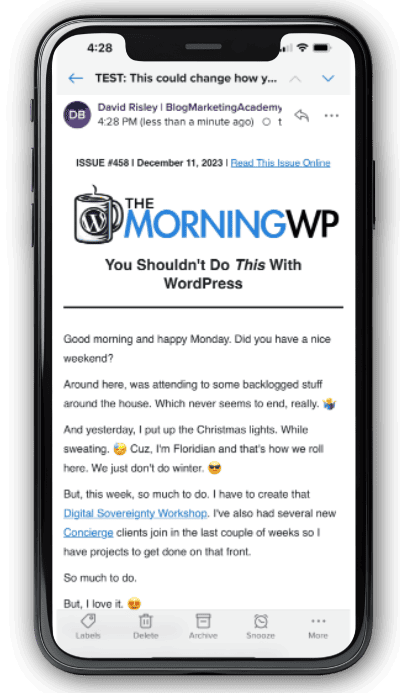 The world of business is based on the idea of exchange. And…
The world of business is based on the idea of exchange. And…
… bloggers who want to make money on the Internet need to focus less on tweets and comments, and more on what they’re actually producing that can be exchanged with others for money.
This idea of exchange is so fundamental. The simple idea that one pays a certain amount and gets a certain thing in return. All of us have a natural sense of exchange, and where businesses violate it, things go wrong.
The criminal seeks to engage in no exchange at all. They want something for nothing. So, they steal and they trick. To a large degree, our government operates this way today. They take from one group and give to another and they violate the natural way that exchange works.
You’ve got some businesses who deliver less than they were paid. These businesses generally don’t last very long because customers get pissed off. I would say that the internet marketing niche itself has engaged in a lot of under-delivered exchange. People will only buy so many $2k products and not get back $2K before realizing something shady is happening.
People have the expectation that they will get an even exchange in business. If you pay X dollars, you expect X in value. You go and buy a car, you expect a car in great condition and ready to drive away. If a business engages in this on a continual basis, they may or may not survive. It is acceptable, but it only stands out in a world of lowered expectations.
Then, you have the idea of over-delivering.
The word “over-deliver” is used so much these days that it is practically a cliche. However, there’s a reason for that.
But, how?
Nobody is saying that you should offer discounts, or give people more product than they paid for to a degree which would cause you or your business financial hardship. You never want to over-deliver in a way which makes you feel short-changed. After all, the idea of exchange goes both ways. You want the customer to be happy, but YOU need to be happy, too.
We live in a world of impersonal relations, where people are being treated like commodities. Like numbers. In this world, genuinely CARING about your customer and their happiness, and treating them like an individual, is the perfect means of over-delivering.
Let’s look at some ideas for a business owner – whether offline or online:
- Wish your customers “happy birthday” on their big day. Of course, this means you need to ask them their birthday, have a system to notify you, and take the time to do it. You could send out birthday cards using something like SendOutCards, or go as simple as connecting on Facebook and posting on their wall.
- Deliver something after they buy from you which they didn’t expect. Perhaps an unannounced bonus on the “thank you” page. So much better than assaulting their eyes with endless upsells and downsells after they buy from you.
- When a customer buys from you, how about a simple personal email to thank them. I’m not talking about an autoresponse from Aweber. No, I mean REALLY a personal email that you take the time to send to them individually. Or, take it up a notch and send them a signed letter in the mail. That will stand out much more than an email these days.
- If a customer says something nice about you, send them a gift. I was pleasantly surprised recently when I got an unexpected package in the mail from Aweber. A T-shirt and a little hat, and a hand-written postcard thanking me for this video where I talked about why I use Aweber. Totally unexpected.
These small over-deliveries should be made a habit within your business. One should systematize it.
I’m following my own advice on this. I’m in the process of getting a CRM (customer relationship manager) set up so that we can stay in closer touch with customers of Blog Marketing Academy. It will be the hub of my ability to over-deliver as a matter of routine. I aim to bring the concept of CUSTOMER SERVICE back to the world of online business.
So, how can you apply this to your business?
Do you have any examples where you’ve been on the recieving end of this? How did it make you feel about that business?
Post in the comments! 🙂
Got A Question? Need Some Assistance?
Have a question about this article? Need some help with this topic (or anything else)? Send it in and I’ll get back to you personally. If you’re OK with it, I might even use it as the basis of future content so I can make this site most useful.



